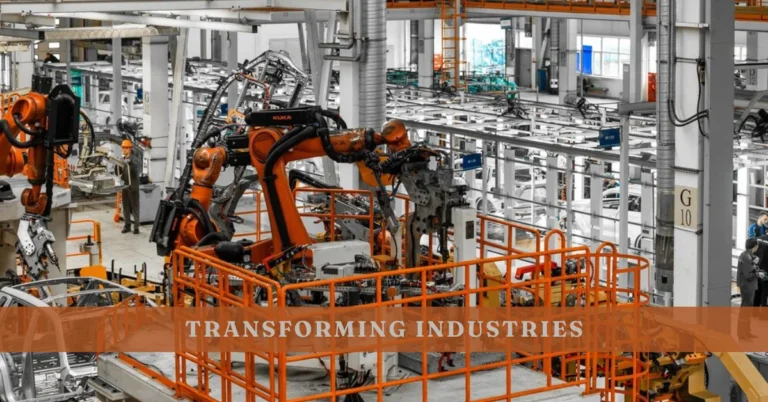Introduction to Transforming Industries
As we stand on the brink of a technological revolution Transforming Industries , automation is reshaping the very fabric of industries around the globe. From manufacturing floors humming with robotic arms to offices buzzing with AI-driven analytics, the landscape is changing rapidly. The integration of automated systems promises not only efficiency but also innovation at an unprecedented scale. But what does this mean for workers and businesses alike? How are different sectors adapting to these sweeping changes? Let’s embark on a journey through this transformative wave and explore how automation is redefining our world.
The Impact of Automation in Different Industries
Automation is reshaping various sectors, introducing efficiency like never before. In manufacturing, robots streamline production lines. Tasks that once took hours are completed in minutes.
The healthcare industry also benefits significantly. Automated systems handle record-keeping and scheduling, allowing medical staff to focus more on patient care. This shift not only improves service quality but enhances overall outcomes.
In agriculture, automated machinery optimizes planting and harvesting processes. Drones monitor crop health while sensors provide real-time data for better yield management.
Retail has embraced automation too. Self-checkout stations reduce wait times and enhance the shopping experience. Inventory management software ensures stock availability without manual oversight.
Even in finance, algorithms process transactions faster than human capability. Fraud detection systems analyze patterns instantly to safeguard assets.
Each sector experiences a unique transformation as automation continues to evolve, driving innovation across the board.
Advantages and Disadvantages of Automation
Automation brings a wealth of advantages to industries. First, it significantly boosts efficiency. Machines can perform repetitive tasks faster and with greater precision than humans.
Cost savings are another major benefit. Businesses can reduce labor costs while minimizing errors in production processes. This leads to higher profit margins.
However, automation isn’t without its drawbacks. Job displacement is a serious concern as machines take over roles traditionally held by people. This creates economic shifts that require workforce retraining.
Moreover, reliance on technology raises vulnerabilities. Technical failures or cyber threats can disrupt operations and lead to costly downtime.
Balancing these pros and cons is essential for companies navigating the transition toward automated systems. The key lies in strategic implementation that considers both operational needs and human impact.
Case Studies of Successful Automation Implementation
One notable case of successful Transforming Industries is found in the manufacturing sector. A leading automotive company integrated robotic arms into their assembly line. This innovation reduced production time by 30%. The robots efficiently handled repetitive tasks, allowing human workers to focus on quality control and complex problem-solving.
In healthcare, a major hospital adopted automated patient management systems. This technology streamlined appointment scheduling and improved patient flow. As a result, waiting times decreased significantly, enhancing overall patient satisfaction.
Retail has also seen transformative changes through automation. An online retailer implemented advanced inventory management software that predicts stock levels based on customer demand patterns. This foresight minimizes overstock situations and ensures timely replenishment.
These examples highlight the diverse applications of automation across industries. Each case reflects how tailored solutions can drive efficiency and improve service delivery while meeting market demands effectively.
Challenges Faced in Implementing Automation
Implementing Transforming Industries is not without its hurdles. One of the primary challenges is resistance from employees. Many fear that machines will replace their jobs, leading to anxiety and pushback against new systems.
Another issue lies in integrating automated solutions with existing technology. Legacy systems may not be compatible, requiring significant investment in upgrades or complete overhauls.
Additionally, organizations often face a skills gap. Employees may lack the necessary training to operate advanced technologies effectively, hindering productivity.
Data security also becomes a concern as automation increases reliance on digital platforms. Cyber threats can compromise sensitive information if proper safeguards are not established.
Measuring ROI from automation projects can be tricky. Companies must navigate complex metrics and determine how to assess success accurately while justifying expenditures.
Future Predictions for Automation
The future of Transforming Industries is poised for remarkable growth. As technology advances, we can expect even greater integration into daily operations across various sectors.
Artificial Intelligence will play a crucial role in this evolution. Smart machines will not only replicate tasks but also learn and adapt to improve efficiency over time. This shift could redefine job roles, focusing on human creativity and strategic thinking instead.
Moreover, industries like healthcare and manufacturing are likely to see groundbreaking innovations. Automation may enhance diagnostic accuracy or streamline production processes, leading to better outcomes.
On the flip side, ethical considerations surrounding workforce displacement will emerge. Society must navigate these challenges while harnessing the benefits of automation.
As companies prioritize sustainability, automated solutions might contribute significantly to reducing waste and energy consumption. The intersection of automation with ecological goals presents exciting possibilities for a greener future.
Conclusion
Transforming Industries is reshaping the landscape of various industries, paving the way for efficiency and innovation. Organizations are witnessing enhanced productivity and reduced operational costs as they embrace automated processes. The balance between reaping these benefits while addressing challenges remains delicate.
The future holds vast possibilities for further transformation across sectors. As technology continues to advance, we can anticipate even more sophisticated automation solutions that will impact our daily lives in ways we have yet to imagine. Staying informed about these changes ensures businesses remain competitive in an evolving marketplace where adaptability is key.
Organizations willing to invest in automation stand poised not just for growth but also for redefining their roles within their respective industries. Embracing this shift may very well be the foundation upon which tomorrow’s success stories are built, leading us into a new era of industrial evolution.
FAQs
Q: How does automation transform industries?
Ans: Automation revolutionizes industries by increasing efficiency, reducing errors, and enhancing production speed through advanced technologies like robotics and AI.
Q: What are key technologies driving automation?
Ans: Robotic arms, computer vision systems, and AI-powered software are key technologies reshaping industrial processes.
Q: Why is automation important in manufacturing?
Ans: Automation ensures precision, meets modern demands for speed, and reduces operational costs, making it essential for competitive manufacturing.
Q: Can automation improve workforce productivity?
Ans: Yes, automation handles repetitive tasks, allowing workers to focus on higher-value, strategic roles.
Q: What industries benefit most from automation?
Ans: Manufacturing, logistics, healthcare, and retail are among the industries experiencing significant transformation through automation.

